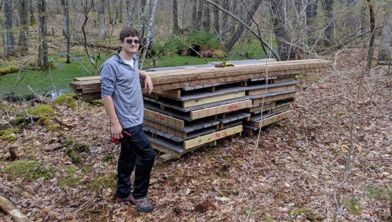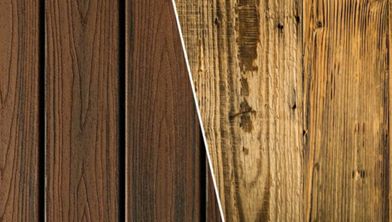NexTrex® Creates Sustainable Solutions for Your Favorite Brands
In the spring of 2020, as Americans hunkered down for what would be more than two years of significant life disruption due to the COVID-19 pandemic, many of us turned to the Internet for solutions. From the safety of home, we had everything from toilet paper to hiking gear to garden seeds shipped to us.
Online sales skyrocketed 71 percent in the second quarter of 2020 and 55 percent in the third quarter. The National Retail Federation reported that the trend continued through 2021, and the November-December holiday season grew 14.1 percent over 2020 to $886.7 billion, easily beating forecasts and setting new records, despite challenges from inflation and supply chain disruptions. Online sales reached $205 billion, a new holiday season high in the U.S., according to Adobe.
The resulting glut of shipping materials began to concern environmentalists, as well as the companies sending out the packages. Especially worrisome was single-use plastics, given that less than 14 percent of the 86 million tons of plastic packaging was being recycled. The National Academy of Sciences in the United States reports that more than 25,000 tons of single-use plastics — from hospital waste to online-shopping package material — wound up in the ocean.
Despite this dismal news, here’s where some of your favorite brands saw an opportunity to do something better for the earth. Through the NexTrex® Retail Recycling Program, companies such as Rent the Runway, LL Bean and Urban Outfitters transform their single-use plastic waste into beautiful and sustainable Trex® outdoor products.

Making sustainability fashionable
Since 2009, Rent the Runway has pioneered the world’s first and largest shared designer closet, leading the way in recommerce. Through its Closet in the Cloud, Rent the Runway’s customers can subscribe to rental, rent items a-la-carte and shop resale from over 780 designer brands. By encouraging its customers to buy less and wear more, the company aims to help combat the 11.3 million tons of textiles that go to the landfills each year, according to the U.S. Environmental Protection Agency. And it’s working with 89% of Rent the Runway’s subscribers saying they buy fewer clothing since purchasing a membership.
In addition to leveraging its rental platform to extend the useful life of garments and reduce fashion waste, the company also aims to embed sustainability throughout its operations. For example, Rent the Runway partners with several organizations to either reuse, recycle, or donate garments that can no longer be rented through their platform, achieving nearly 100% diversion from landfill.
One unique environmental challenge for the company was the polycarbon garment covers, which protect each garment after it’s cleaned. It’s now combatting this impact by taking off the plastic bags before mailing to consumers and sending the plastics to be recycled through Trex.
“As a company, we are focused on minimizing waste from our operations,” said Megan Farrell, Senior Director of Sustainability at Rent the Runway. “Our partnership with Trex has helped us recycle a significant amount of our poly garment covers, keeping the plastic out of landfill.”
Rent the Runway shared with its followers on Twitter, “In 2021, RTR recycled 23,000 pounds of clothing, accessories, & reusable packaging through partner organizations – and over 95 TONS of plastic through @Trex_Company (AKA the weight of 14 elephants).”

Urban Outfitters, part of the URBN family of fashion, also focuses on sustainability, and partners with Trex for recycling of its poly bags.
Julie Verdugo, Director of Sustainability and Social Impact for Free People and Urban Outfitters, said UO began recycling with Trex two years ago, Free People started at the end of last year, and Anthropologie is in the process of joining the program. The efforts began organically with some entrepreneurial employees suggesting the move; now, 183 stores are using NexTrex. In just the last year, they’ve recycled 100,000 pounds of plastic.
“Partnering with Trex was important because we wanted a sustainable solution,” said Verdugo. “They are creating a durable product and saving trees — that circularity of materials and the transparency into where it’s going is important to us. We’re determined to keep everything out of the landfill, and the partner has to be ethically sound.”
Lucia Pellegrini, Facilities Manager for LL Bean, echoed this sentiment. She said, “We appreciate our partnership with the Trex Company over the last several years. It’s nice to know that our plastic waste is being recycled responsibly and resulting in a product that others can enjoy.”
How NexTrex works
When individuals and companies recycle plastic film with NexTrex, they not only help to keep thousands of pounds of waste out of landfills, but they’re also helping Trex to continue to make eco-friendly outdoor products. NexTrex partners with retailers around the country to collect recyclable materials including:
- Grocery and retail bags
- Plastic mailer bags
- Bread bags
- Case overwraps
- Dry cleaning bags
- Newspaper sleeves
- Ice bags
- Ziploc® and other reclose-able bags
- Produce bags
- Bubble wrap
- Salt bags
- Cereal box liners
- Wood pellet bags
We strive to offer a program to make recycling that’s as hassle-free as our decking. NexTrex is easy to implement for retail stores of any size. Trex provides participants with support, instructional videos, promotional materials and a list of qualifying recyclable materials.
The Trex decking portfolio is made from up to 95 percent recycled content. A portion of Trex's recycled plastic film comes from post-consumer sources – ranging from the overwrap on paper towels to dry cleaner bags, sandwich bags, newspaper sleeves, package liners and shopping bags to shrink wrap and stretch film used to palletize boxes and equipment.
“Trex is an important partner in our sustainability efforts,” said Farrell. “The results really speak for themselves – we’re proud to partner with Trex on our plastic recycling solutions.”
To learn more, download this flyer.
This content was partially or fully generated by AI and has been reviewed by our team to ensure accuracy and relevance.






































